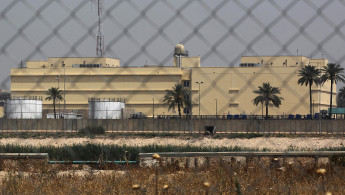Iraq scrambles to reassure US after embassy attack
Iraqi and American officials have been engaged in dialogue following the landing of a Katyusha rocket near the US Embassy in Baghdad.
The rocket crashed into Baghdad's Green Zone on Sunday, which houses government offices and embassies including the US mission, Iraqi security services said in a statement.
The rocket - which came after Washington ordered the evacuation of non-essential diplomatic staff from the Baghdad embassy and the Erbil consulate citing threats from Iranian-backed Iraqi militias - caused no casualties.
Sources told The New Arab that Iraqi officials were trying to reassure US embassy staff and that the Iraqi embassy in the US was working to prevent “any malicious consequences” from the attack.
The Green Zone, where the US embassy is located, is one of the world's most high-security institutional quarters.
Located in the centre of the Iraqi capital, it houses the Iraqi parliament, the prime minister's office, the presidency, other key institutions, top officials' homes and foreign embassies.
The American embassy in Baghdad, surrounded by concrete walls, is the world's largest embassy.
Read more: Iraq finds itself between the competing interests of US and Iran
The US has demanded guarantees of safety for their embassy staff and citizens in Iraq as tensions with Iran rise.
The Katyusha rocket is believed to have been manufactured locally and was launched from the eastern part of Baghdad.
Media reports said that a missile launch pad was found near the Technology University in east Baghdad - a militia stronghold.
The Iran-backed Popular Mobilisation, a government-sponsored coalition of mostly Shia militias, is highly influential in Iraq. It was formed in 2014 to fight IS militants however has been previously accused by Amnesty International of committing sectarian-motivated war crimes against Iraq’s Sunni minority.
Hadi Al-Ameri, the spokesman for the Fatah Alliance, the Popular Mobilisation’s political wing, called for “the removal of the sceptre of war from Iraq first and the region second” warning that if a war broke out in the Gulf region “it would burn everybody”, adding that neither Iran nor the US wanted war.
However, President Donald Trump on Monday threatened Iran, tweeting: “If Iran wants to fight, that will be the official end of Iran. Never threaten the United States again!”
The Trump administration has dispatched an aircraft carrier and heavy B-52 bombers to the region amid rising tensions.
Follow us on Twitter: @The_NewArab





 Follow the Middle East's top stories in English at The New Arab on Google News
Follow the Middle East's top stories in English at The New Arab on Google News


![22 Arab countries at COP29 have rejected the targeting of fossil fuels [Getty]](/sites/default/files/styles/image_330x185/public/2024-11/GettyImages-2184289638.jpg?h=199d8c1f&itok=ptHl5bec)